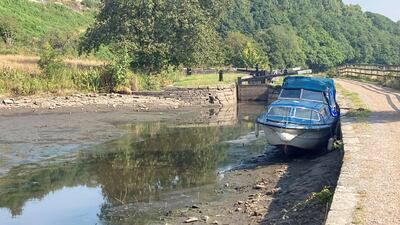Forecasters have said that wildfires across the UK remain a “significant risk” due to dry conditions across the country.
The fresh warning comes after Britain’s second heatwave this summer saw a high of 35°C in London on Saturday and an official drought was declared in eight areas of England on Friday.
Combined with July's record-breaking heatwave, rivers, reservoirs and aquifers have been depleted, raising the risk of wildfires as soil has become “baked dry”, said the Meteorological Office's Dan Stroud.
"It has been extremely dry for an extended period and the ground and vegetation has been baked dry, so there is a significant risk," he said.
However, the expected arrival of thunderstorms in northern parts of the UK on Sunday will be a welcome reprieve for farmers and gardeners looking to the skies for water.
The extreme weather conditions will nevertheless be disruptive, with yellow thunderstorm warnings in place from noon on Sunday until 6am on Monday for most of Scotland and Northern Ireland, and from 10am until midnight for Wales and England.
“As we move into Sunday, a slight change with low pressure will start to arrive from the south,” Mr Stroud said.
“There is an increasing risk of some isolated showers across Devon and Cornwall, very early on Sunday.
“Most places will still be generally dry and fine, with some strong August sunshine, with those temperatures rising rapidly during the course of Sunday morning and into the afternoon.”
An amber heat warning remains in place until midnight on Sunday across parts of England and Wales.
This means heat-related illnesses including sunburn and heat exhaustion are “likely” among the general population, and delays to public transport are “possible”.
A day of wildfires in south England
Earlier this week, fire services in Dorset and Wiltshire said there had already been a “massive” near 500 per cent increase in wildfires during the first 10 days of August, compared with 2021.
In Dorset, firefighters worked through the night to bring a wildfire at Studland under control, which was believed to have been sparked by a disposable barbecue, only to find an unexploded piece of ammunition believed to date from the Second World War on the scorched heathland.
County police said a bomb disposal unit would be attending and warned the public in the surrounding area they may hear a loud bang as they disposed of the device.
The Cornwall Fire and Rescue Service was battling a large wildfire in the town of Camborne. Authorities asked the public to stay away from the scene, as there was a danger of live electric wires falling.
Fire crews in Derbyshire were still tackling a huge blaze at 9pm on Friday, with four fire engines at the scene in Creswell, Worksop.
Footage shared online showed flames filling the horizon and large plumes of smoke in the sky above a residential area.
Derbyshire Fire and Rescue Service also fought embankment blazes beside a railway in Matlock, and near Junction 26 of the M1.
The service said it was “planning for a busy weekend” of further fires. It echoed the pleas of fire services across the nation by asking people not to light fires in their gardens or use portable barbecues.
Ten fire engines and 70 firefighters tackled a grass fire on Rammey Marsh in Enfield on Saturday.
"An area of grassland measuring around 900m by 600m remains alight," the service said, warning it was producing "a lot of smoke over the M25 between junctions 25 and 26".
About 35 firefighters tackled a blaze that destroyed two hectares of grassland at the Leyton Flats wildlife reserve in Waltham Forest, east London, on Friday.
Between August 1 and 10, Dorset and Wiltshire crews attend 180 wildfires, compared with just 34 over the same period last year — an increase of 429 per cent.
A spokeswoman said operational staff had “never had a year like this one, it is just unprecedented”.











